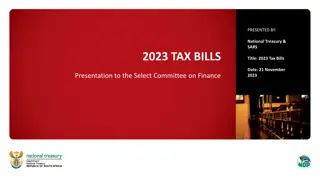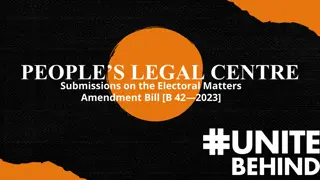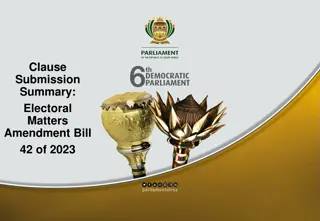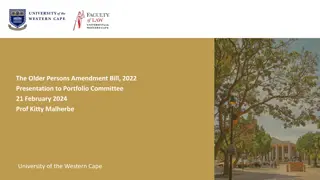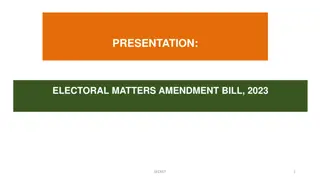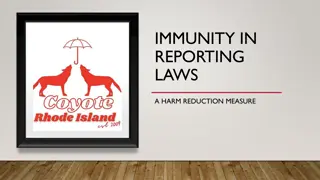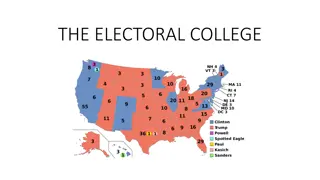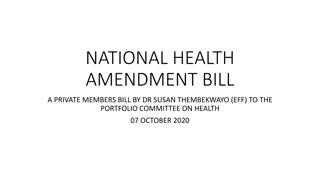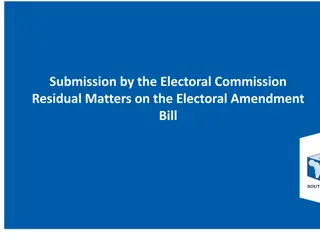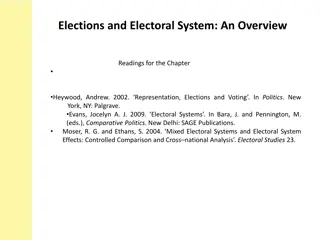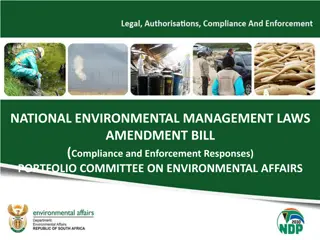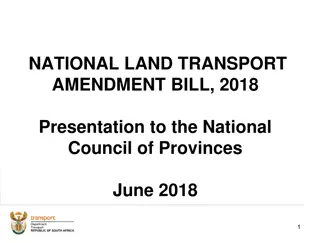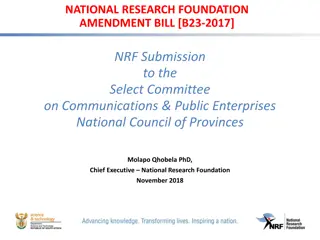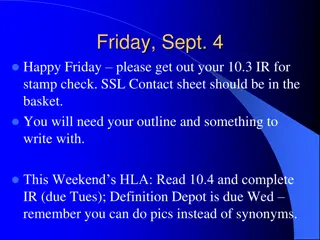Electoral Laws Amendment Bill 2020 Overview
The Electoral Laws Amendment Bill 2020 aims to modify key legislation in preparation for upcoming general local government elections. It includes amendments to the Electoral Commission Act, Electoral Act, and Local Government: Municipal Electoral Act to streamline processes, update definitions, registration of parties, voting procedures, and voter access. The Bill seeks to align provisions and make consequential amendments to improve the electoral process efficiency.
Download Presentation

Please find below an Image/Link to download the presentation.
The content on the website is provided AS IS for your information and personal use only. It may not be sold, licensed, or shared on other websites without obtaining consent from the author.If you encounter any issues during the download, it is possible that the publisher has removed the file from their server.
You are allowed to download the files provided on this website for personal or commercial use, subject to the condition that they are used lawfully. All files are the property of their respective owners.
The content on the website is provided AS IS for your information and personal use only. It may not be sold, licensed, or shared on other websites without obtaining consent from the author.
E N D
Presentation Transcript
Electoral Amendment Bill, 2020 Sy Mamabolo Chief Electoral Officer 9 October 2020
Background The Electoral Laws Amendment Bill ( the Bill ) seeks to amend three pieces of legislation, namely, the Electoral Commission Act, 1996 (Act No. 51 of 1996) ( Electoral Commission Act ), the Electoral Act, 1998 (Act No. 73 of 1998) ( Electoral Act ) and the Local Government: Municipal Electoral Act, 2000 (Act No. 27 of 2000) ( Local Government: Municipal Electoral Act ), in preparation for the forthcoming general local government elections, To align the relevant provisions of the legislation relating to the national and provincial elections. 2
Purpose of the Bill The purpose of the Bill is to amend the (a) Electoral Commission Act, so as to insert new definitions, amend provisions regarding the registration of parties by providing for parties to be registered at the national, provincial and metropolitan or district municipality levels while repealing provisions relating to registration of parties in respect of particular local municipalities, to streamline provisions regarding the process of applying for the registration of parties, objections against such applications and appeals against the chief electoral officer s decisions in relation to such applications, 3 to make consequential amendments and to repeal obsolete provisions;
Purpose of the Bill continued (b) Electoral Act, to amend provisions relating to the submission of lists of candidates; to amend provisions relating to special votes in elections for the National Assembly; to authorise the Commission to prescribe a different voting procedure; to amend provisions relating to the procedure concerning provisional results and voting materials; to provide for the limited applicability of the Code; to amend Schedule 3; and so as to insert a new definition, to amend the provisions regarding public access to the voters roll; to update references to repealed legislation; 4 to amend provisions allowing voters to vote in voting district where they are not registered;
Purpose of the Bill continued (c) Local Government: Municipal Electoral Act, so as to insert and delete certain definitions; to amend the requirements for parties contesting elections by way of party lists and for ward candidates to contest elections; to authorise the Commission to prescribe a different voting procedure generally and specifically for those voters whose names appear on the voters roll, without addresses; to amend provisions relating to the effect of certain irregularities, to make consequential amendments and to delete obsolete provisions, and to provide for matters connected therewith. 5
OBJECTS OF BILL The main objective of this Bill is to enhance the existing legislative mechanisms that ensure free and fair elections, in accordance with the Constitution of the Republic of South Africa, 1996. Furthermore, the Bill seeks to provide legislative authorisation for new innovations in electoral practices in keeping with best practice to improve the Commission s efficiency in managing elections, and to align the Electoral Act with the provisions of the Protection of Personal Information Act, 2013 (Act No. 4 of 2013) regarding the protection of the personal information of voters against unreasonable 6
CLAUSE-BY-CLAUSE ANALYSIS Electoral Commission Act Clause 1 Clause 1 of the Bill amends section 1 of the Electoral Commission Act, to insert definitions of districtmunicipality , localmunicipality and metropolitanmunicipality . Clause 2 Clause 2 amends section 12 by substituting Public Finance Management Act, 1999 for the reference to the Exchequer Act, 1975 . 7
CLAUSE-BY-CLAUSE ANALYSIS continued Electoral Commission Act Clause 3 Clause 3 revises section 15 of the Electoral Commission Act, to amend provisions regarding the registration of parties by providing for parties to be registered at the national, provincial and metropolitan or district municipality levels while repealing provisions relating to registration of parties in respect of particular local municipalities, and to streamline provisions regarding the process of applying for and public participation in, applications for the registration of parties. Clause 4 8 Clause 4 deletes section 15A of the Electoral Commission Act, which deals with the registration of parties for municipal elections, in consequence of this issue being regulated by the proposed amendment to section 15.
CLAUSE-BY-CLAUSE ANALYSIS continued Electoral Commission Act Clause 5 Clause 5 amends section 16 of the Electoral Commission Act, by amending the provisions regarding the publication of the prescribed notice of application for the registration of a party and the provisions regarding who may appeal against the chief electoral officer s decision in relation to an application for the registration of a party. Clause 6 Clause 6 amends section 23 of the Electoral Commission Act by deleting 9 subsection (3) thereof.
CLAUSE-BY-CLAUSE ANALYSIS continued Electoral Act Clause 7 Clause 7 amends section 1 of the Electoral Act, to insert the definition of votingday . Clause 8 Clause 8 revises section 16 of the Electoral Act by removing the existing entitlement of any person to a copy of or extract from the voters roll or a segment thereof, and by inserting a new subsection (5) to authorise the chief electoral officer to redact any information from the voters roll made available to parties and candidates to protect the personal information of voters against unreasonable disclosure. These amendments seek to harmonise the Electoral Act with the provisions of the Protection of Personal 10 Information Act, 2013 (Act No. 4 of 2013) regarding the protection of the personal information of voters against unreasonable disclosure.
CLAUSE-BY-CLAUSE ANALYSIS continued Electoral Act Clause 9 Clause 9 revises section 24A of the Electoral Act to allow a voter who is unable, on voting day, to cast her vote in the voting district where she is registered to cast her vote in another voting district provided that she notifies the chief electoral officer in the prescribed manner of his intention to cast her vote in another specified voting district within the Republic on voting day. Voters utilising this provision will only be able to cast votes in elections for provincial legislatures if the voting district in which they cast their votes falls within the province in which they are registered as voters. 11
CLAUSE-BY-CLAUSE ANALYSIS continued Electoral Act Clause 10 Clause 10 amends section 27 of the Electoral Act, in order to dispense with the requirement for parties to submit a prescribed notice of acceptance of nomination together with their party lists, and to instead require parties to submit the notice of nomination to the Commission upon request in the prescribed manner. Clause 11 Clause 11 effects technical amendments to section 28 of the Electoral Act consequent upon the amendment of section 27. 12 Clause 12 Clause 12 effects technical amendments to section 30 of the Electoral Act consequent upon the amendment of sections 27 and 28.
CLAUSE-BY-CLAUSE ANALYSIS continued Clause 13 Clause 13 amends section 33 of the Electoral Act by removing the requirement for voters who will be abroad on voting day to apply for a special vote and instead requires such a voter whose name appears on the segment of the voter s roll for persons who are: - in the Republic, to notify the chief electoral officer in the prescribed manner by not later than the relevant date stated in the election timetable of his or her intention to vote outside the Republic and the location of the South African embassy, high commission or consulate where s/he will cast his or 13 her vote;
CLAUSE-BY-CLAUSE ANALYSIS continued - ordinarily resident at a place outside the Republic and intends to vote at the South African embassy, high commission or consulate on whose segment of the voters roll his or her name appears, to simply present himself or herself to vote at the South African embassy, high commission or consulate concerned; - ordinarily resident at a place outside the Republic and intends to vote at a specified voting station within the Republic or at a South African embassy, high commission or consulate other than one on whose segment of the voters roll his or her name appears, to notify the chief electoral officer in the prescribed manner by not later than the relevant date stated in the election timetable of his or her intention to vote at a specified voting station within the 14 Republic or at a specified South African embassy, high commission or consulate.
CLAUSE-BY-CLAUSE ANALYSIS continued Clause 14 Clause 14 amends section 38 in the Electoral Act by authorising the Commission to prescribe a different voting method. Clause 15 Clause 15 revises section 50 of the Electoral Act, to authorise the Commission to prescribe the form required be completed at the conclusion of counting reflecting the result of the count in respect of each ballot conducted at that voting station. Clause 16 Clause 16 amends section 99 of the Electoral Act in order to insert a new 15 (1A), which provides that the Code is binding from the date on which the notice calling an election is published to the date on which the result of the election is declared.
CLAUSE-BY-CLAUSE ANALYSIS continued Clause 17 Clause 17 amends Schedule 3 to the Electoral Act to require the Commission to complete and publish the determination of seats of the National Assembly and all provincial legislatures ahead of every election in the prescribed manner. Local Government: Municipal Electoral Act Clause 18 Clause 18 amends section 1 of the Local Government: Municipal Electoral Act to insert the definition of district municipality and delete the obsolete definition of district management area . 16
CLAUSE-BY-CLAUSE ANALYSIS continued Clause 19 Clause 19 amends section 14 of the Local Government: Municipal Electoral Act to mirror the proposed amendment of section 27 of the Electoral Act, in order to dispense with the requirement for parties to submit a prescribed notice of acceptance of nomination together with their party lists in local government elections, and instead to require parties to submit the notice of acceptance of nomination to the Commission upon request in the prescribed manner, and to make consequential amendments. Clause 20 Clause 20 amends section 17 of the Local Government: Municipal Electoral Act in order to dispense with the requirement in ward elections for the submission of a prescribed notice of acceptance of nomination and a candidate s identity 17 document together with the prescribed nomination form, and instead to require the submission of these documents to the Commission upon request in the prescribed manner, and to make consequential amendments.
CLAUSE-BY-CLAUSE ANALYSIS continued Clause 21 Clause 21 amends section 47 of the Local Government: Municipal Electoral Act, in order to mirror the provisions of:- - section 38(8) of the Electoral Act and thus authorise the Commission to prescribe a different voting procedure for those voters whose names appear on the voters roll, without addresses; and - the proposed amendment of section 38 in the Electoral Act by authorising the Commission to prescribe a different voting method in local government elections. 18
CLAUSE-BY-CLAUSE ANALYSIS continued Clause 22 Clause 22 amends section 84 of the Local Government: Municipal Electoral Act, to remove all references to a party list submitted by a party from that section. Clause 23 Clause 23 amends section 87(1) of the Local Government: Municipal Electoral Act to mirror the proposed amendment to section 99 of the Electoral Act, in order to clarify that the Code is binding from the date on which the notice calling an election is published to the date on which the result of the election is declared. 19 Clause 24 Clause 24 deals with the short title and commencement of the Act.
IMPLICATIONS OF THE INTRODUCTION OF THE BILL ORGANISATIONAL AND PERSONNEL IMPLICATIONS There are no additional personnel implications as a result of the introduction of the Bill. FINANCIAL IMPLICATIONS FOR STATE Most of the amendments proposed by this Bill relate to normal operations related to elections. For this reason, the financial implications thereof have already been taken into account when compiling the budget for those elections. COMMUNICATION IMPLICATIONS 20 There are no communication implications envisaged as a result of the introduction of the Bill.
CONSULTATION OBLIGATIONS The proposed Electoral Laws Amendment Bill will give effect to sections 1(d), 19, 46(1), 105(1) and 157 of the Constitution of the Republic of South Africa, 1996. INSTITUTIONS CONSULTED - The Electoral Commission; - The National Party Liaison Committee; and - The Information Regulator. 21
PARLIAMENTARY PROCEDURE The Constitution prescribes procedures for the classification of Bills, therefore a Bill must be correctly classified so that it does not become inconsistent with the Constitution. We have considered the Bill against the provisions of the Constitution relating to the tagging of Bills and against the functional areas listed in Schedule 4 (functional areas of concurrent national and provincial legislative competence) and Schedule 5 (functional areas of exclusive provincial legislative competence) to the Constitution. 22
PARLIAMENTARY PROCEDUREcontinued The established test for classification of a Bill is that any Bill with provisions which in substantial measure fall within a functional area listed in Schedule 4 to the Constitution must be classified in terms of that Schedule. The process is concerned with the question of how the Bill should be considered by the provinces and in the National Council of Provinces. Furthermore, how a Bill must be considered by the provincial legislatures depends on whether it affects the provinces. The more a Bill affects the interests, concerns and capacities of the provinces, the more say the provinces should have on the contents of the Bill. Therefore, the issue to be determined is whether the provisions contained in the Bill, in substantial measure, fall within a functional area listed in Schedule 23 4 to the Constitution.
PARLIAMENTARY PROCEDUREcontinued The Bill primarily seeks to amend three pieces of legislation, namely, the Electoral Commission Act, the Electoral Act and the Local Government: Municipal Electoral Act to accommodate new electoral innovations and align the relevant provisions of the various pieces of legislation in order to ensure free and fair elections. The provisions of the Bill have been carefully examined to establish whether, in substantial measure, they fall within any of the functional areas listed in Schedule 4 to the Constitution. In our view, Item 17 of the Bill affects provinces in as much as it amends the provisions regulating the Commission s determination and publication of the number of seats of a provincial legislature set out in Schedule 3 to the 24 Electoral Act, 1998. We are therefore of the opinion that the Bill must be dealt with in accordance with the procedure set out in section 76 of the Constitution.
PARLIAMENTARY PROCEDURE continued We are also of the opinion that it is not necessary to refer the Bill to the National House of Traditional Leaders in terms of section 18(1)(a) of the Traditional Leadership and Governance Framework Act, 2003 (Act No. 41 of 2003), since it does not contain provisions pertaining to customary law or customs of traditional communities. 25
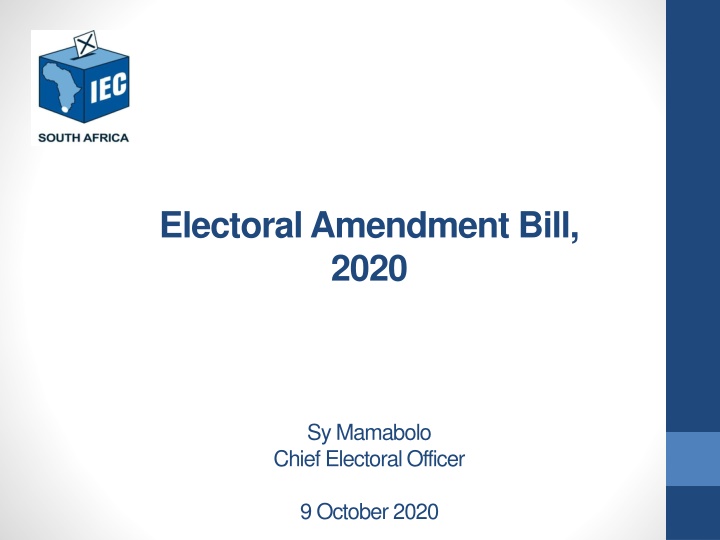

![RE: ELECTORAL MATTERS AMENDMENT BILL [ B42-2023]](/thumb/18837/re-electoral-matters-amendment-bill-b42-2023.jpg)


